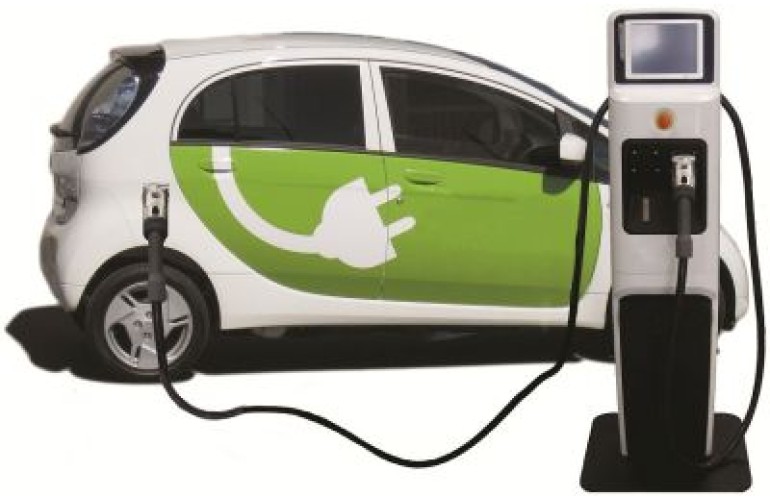 Subscribe
Subscribe- Login
-
/
Sign Up
- US Black Engineer
- >>
- Articles
- >>
- SCIENCE SPECTRUM
- >>
- Automotive News
- >>
- GE Advances Electric Vehicle Adoption
|
Getting your Trinity Audio player ready...
|
GE has unveiled the residential GE WattStation, an easy-to-use electric vehicle (EV) charger. Following the announcement of the public charger in July, the residential GE WattStation is designed to help accelerate the adoption of plug-in electric vehicles by significantly decreasing the time needed for vehicle charging and, using smart grid technology, allowing utility companies to manage the impact of electric vehicles on the local and regional grids.
Michael Mahan, the global product manager for GE WattStation, said, “The residential WattStation’s easy functionality and design allows for the uncomplicated integration of quick electric vehicle charging into your everyday activities.”
GE has partnered with ServiceMagic, the nation’s leading website connecting consumers with service professionals, to provide a network of certified electricians for reliable installation of the residential WattStation in the consumers’ home. In addition GE Capital, working with ServiceMagic, will provide financing options, enabling consumers to pay for the charger and installation costs over time.
“GE Capital’s flexible financing options, offered by ServiceMagic professionals, provides a simple process for consumers to pay for the WattStation and related electrical installation services. This is imperative to widespread electric vehicle adoption,” said Bruce Christensen, general manager of Home Improvement, GE Capital – Sales Finance.
Combining functionality with consumer friendly form from renowned industrial designer Yves Behar, the GE WattStation on average decreases electric vehicle charging time from 12-18 hours to as little as four to eight hours compared to standard charging level 1, assuming a full-cycle charge for a 24 kWh battery.
“The residential GE WattStation design is friendly and so simple to adopt that it will literally change one’s life overnight: No more trips to the gas station, something that surely no one will miss,” said Yves Behar, founder of fuse project. GE WattStation will be commercially available globally in 2011.
In addition to the GE WattStation, GE recently announced two new partnerships to advance electric vehicle adoption.
In April 2010, Project Get Ready, a non-profit initiative led by Rocky Mountain Institute to help communities prepare for electric vehicles, named GE a technical advisor focusing on design and planning of the local and regional electric grids for electric vehicles.
When GE unveiled the EV charging station in July the company said it would be piloted this year at commercial sites, along with Purdue and the University of California San Diego. Recently, General Electric reached an agreement with Purdue University to place up to 10 of its new electric vehicle (EV) charging stations on campus beginning by the end of the year. Designed to recharge electric-powered vehicles quickly and easily, the GE EV charging stations will be used by various classes and researchers working on electric-powered technology and to recharge university-operated electric vehicles.
According to university sources, GE and Purdue officials are finalizing where the charging stations will be installed, but plans call for the units to be located in prominent and well-lit locations so that electric vehicle drivers can easily access them.
GE says the EV charging station, used either indoors or outdoors and mounted on a wall or a pedestal, decreases the time needed for recharging an electric vehicle from as long as 12-18 hours to as short as four to eight hours. The charging station also is designed to allow utility companies to implement a “smart” electrical distribution system to manage the impact of electric vehicles on local and regional power grids.
President Barack Obama announced August 5 that Purdue University will receive a $6.1 million American Recovery and Reinvestment Act grant to develop degree and training programs for electric vehicles. The government is handing out a total of $2.4 billion in grants to 48 projects in 20 states. He said Indiana is the second largest recipient of grant funding.
Purdue will partner with Notre Dame University, Indiana University-Purdue University Indianapolis, Ivy Tech Community College, Purdue University Calumet and Indiana University Northwest to develop the program. The goal is to educate and train the workforce needed to design, manufacture and maintain advanced electric vehicles and the associated infrastructure.
The Indiana Advanced Electric Vehicle Training and Education Consortium will develop certificate and associate degree programs for vehicle technicians, bachelor’s and master’s degree programs for electric vehicle design and manufacturing engineers, and a certificate program in electric vehicle safety for emergency responders. It also will develop an outreach program to secondary schools and a Web site to provide information on electric vehicles to the general public.
Last spring, the consortium’s first class of students built electric-powered karts and held a grand Prix race at Purdue. GE is a world leader in the energy sector, with a customer base that cuts across the entire electric grid network.


